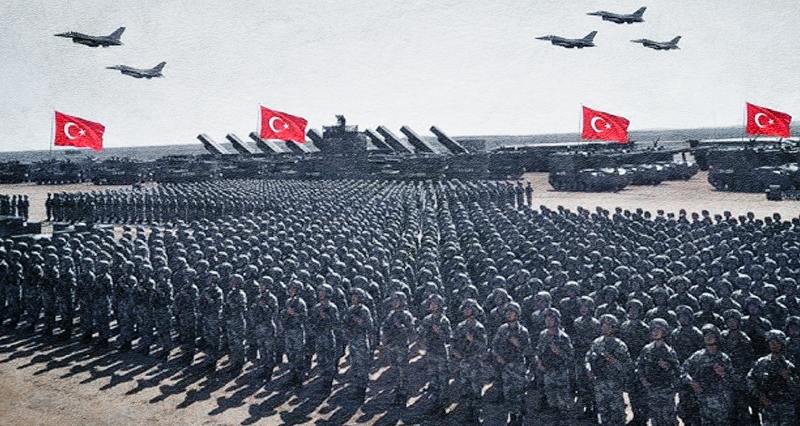Embargoes against Türkiye have motivated the country to develop further its own defense industry, which serves successfully the purpose of fighting terrorism and changes regional dynamics.
Embargoes against Türkiye have motivated the country to develop further its own defense industry, which serves successfully the purpose of fighting terrorism and changes regional dynamics.
By Adem Kılıç, Political Scientist/Author
In the defense industry, Türkiye has evolved from a structure that was 80% foreign-dependent just 20 years ago to a point where it has reduced its foreign dependency to around 20%, largely based on independent, domestic and national production.
However, this transformation does not only mean increasing military capacity.
It means diversifying Türkiye’s foreign policy tools, implementing a new strategy in regional power projection and developing a new strategic paradigm, especially in the fight against terrorism centered in Syria and Iraq.
Thanks to unmanned aerial vehicles, smart munitions, electronic warfare systems and indigenous command and control technologies, Türkiye has become not only a defender but also an active power in the field. This radically changed both regional balances and global perceptions of Türkiye.
Paradigms that gave birth to the new era for Türkiye
The embargoes imposed on Türkiye by the West, especially after 2016, prompted Türkiye to produce its own defense technology, and this breakthrough led to the emergence of a uniquely Turkish model that enabled Türkiye to gain the upper hand both on the ground and at the diplomatic table.
When Türkiye first intervened in the Libyan civil war with UCAVs to ensure the survival of the Tripoli government against the putschist Haftar forces, the world did not realize that it was waking up to a new Turkish reality.
Immediately after Libya, this reality revealed Türkiye’s military technology as an effective pressure factor in its foreign policy in Karabakh and Syria.
Türkiye was now demonstrating its ability and determination to pursue an independent policy where its interests were at stake.
Türkiye’s indigenous and national defense industry products are being purchased by more than 30 countries such as Poland, Ukraine, Qatar and Nigeria, and this development has also brought Türkiye’s position within NATO to a new dimension.
Following these developments, Türkiye was left with only one obstacle. And that is terrorism, which has been exploiting both the economic and human resources of the country for 40 years!
Türkiye’s determination to end the PKK and its extensions in Syria and Iraq
Türkiye’s rise in the defense industry has brought about a radical transformation in the fight against PKK/YPG terrorism, one of the country’s most chronic security challenges.
Türkiye adopted a new security concept based on eliminating threats across borders in 2016, following the “eradicating terrorism at its root” policy first launched in 2015.
In addition to its cross-border terrorist operations in line with its international rights, Türkiye has eliminated the PKK and YPG’s room for maneuver. This was achieved by conducting point operations against PKK and YPG targets with the help of domestically produced UAVs/SUAVs, satellite-supported intelligence systems and smart munitions.
Türkiye, which established safe zones in northern Syria with the Euphrates Shield, Olive Branch and Peace Spring operations, also eliminated the possibility of the YPG, the Syrian branch of the PKK, reaching the Turkish border directly. Since 2019, Türkiye has combined its strategy of eradicating terrorism with the Claw series operations in northern Iraq with its operations in Syria, laying the building blocks for the process leading to the disarmament of terrorist organizations.
The future of Syria, terrorism and Türkiye’s role
Türkiye, which has become the most effective actor in the equation that emerged in the aftermath of the Assad regime in Syria, has also assumed the role of the leading country in the engagement of the Sharaa administration with the world.
As a matter of fact, the Sharaa administration, which focuses on getting the country back on its feet and re-engaging it with the world after the Assad regime collapsed about 6 months ago, is trying to implement the project of integrating YPG militants into the Syrian army with an agreement signed on March 8, again under the leadership of Türkiye.
While Türkiye carries out the “Terror Free Türkiye” project at home, it also acts as the protector of this process in Syria. Türkiye, which has become the guarantor of Syria’s territorial integrity, supports this influence in the field with diplomacy. During US President Trump’s Gulf tour last week, Türkiye arranged a meeting between Ahmed al-Shara and Trump, which led to the lifting of the sanctions imposed on Syria by the US and the West, while ensuring that the process is not hindered with intelligence support. Türkiye was now demonstrating its ability and determination to pursue an independent policy where its interests were at stake.
Conclusion
In the light of all these developments, it is clear that Türkiye’s rise in the defense industry is not only an increase in technical capacity, but also the concretization of a security vision. Türkiye’s new security doctrine, which is taking shape in Syria and Iraq, creates a new reality by revealing a strategy of preventive and permanent intervention supported by technological superiority. The period ahead shows that Türkiye will become an indispensable actor not only within its borders but also in its regional and global security hinterland.
















Leave a Reply